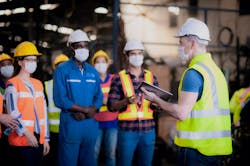Have 10 Minutes? NAHB Says to Halt Work to Prevent Virus Spread
It can take just 10 minutes to remind your jobsite workers of COVID-19 protocols and reinforce a safe workzone, says the National Association of Home Builders. Back in April, at the onslaught of the pandemic, NAHB called for builders to halt work on jobsites for a mere 10 minutes to reiterate COVID-19 safety protocols. The stand down is now being called back into action as virus cases spike throughout the country after the holidays, says NAHB. Such protocols include wearing face coverings, social distancing, cleaning and sanitizing frequently touched tools, and adequate hand washing.
Who Should Participate?
Construction of single-family and multifamily housing has been deemed an “essential infrastructure business” allowing construction to continue. Small and large construction companies, residential construction contractors and subcontractors should all participate in the stand down.
Three Steps to Hold Your Own Stand Down
Prepare. Compile the information you will need for the stand down. NAHB has developed detailed blueprints — in English and Spanish — for builders and trade contractors to conduct their COVID-19 safety stand downs.
Cover the basics. As COVID-19 cases surge, stress the importance of preventing the virus spread by encouraging workers to following basic infection prevention measures.
Hold your stand down. Present the information to the workers, keeping it short and simple. The safety information can be distributed digitally (through email and/or text).
